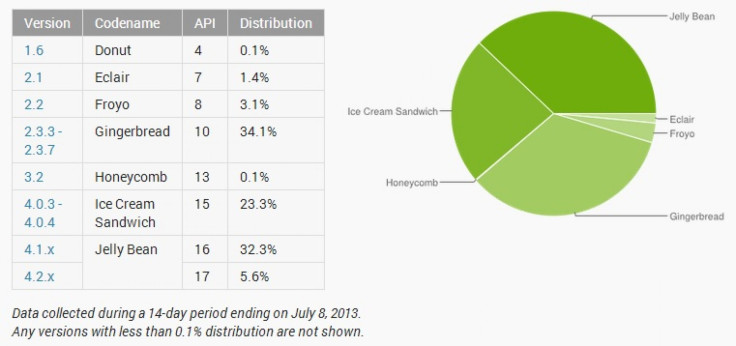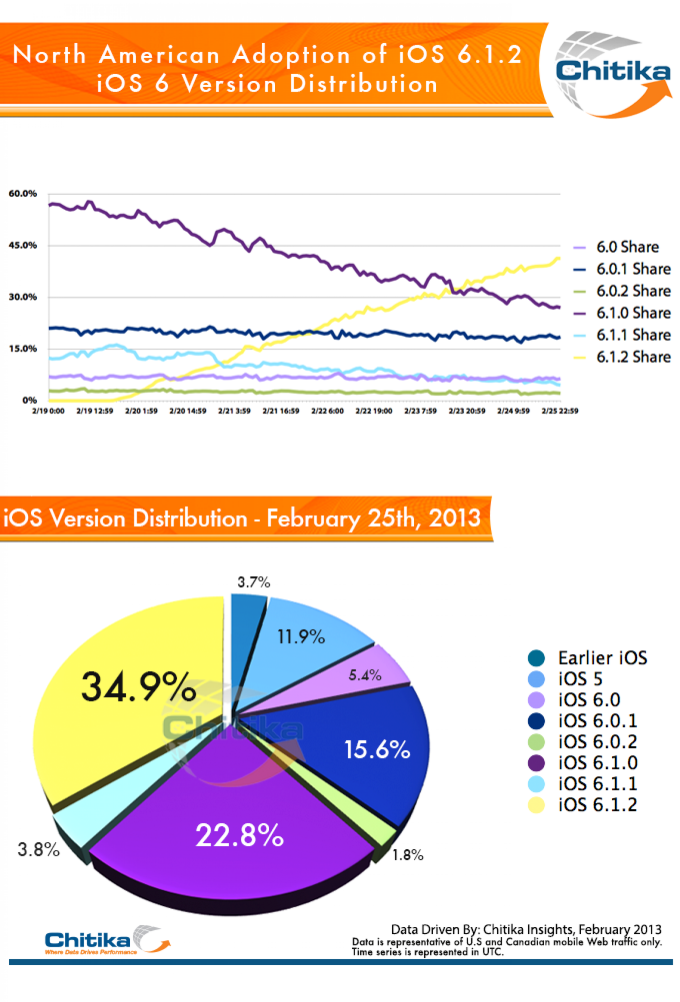Android vs. iOS Adoption Rates: Jelly Bean Finally Most Popular Version Of Google Mobile Operating System

The most recent version of the Android mobile operating system, known as Jelly Bean (version 4.1 and up) is now the most used version of Google’s (NASDAQ:GOOG) platform. It has surpassed its predecessors Ice Cream Sandwich (4.0.3 – 4.0.4), and Gingerbread (2.3.3 - 2.3.7).
Google updated its Android Developer page Monday with the announcement. Such a metric is important to a developer creating an app for the Android OS – it shows which versions of the software are being used most popularly, and therefore, how much of their app needs to be compatible with older versions of software and less capable, lower-powered hardware.

According to the chart, 38.8 percent of Android users are still running a version of the OS older than Ice Cream Sandwich, which was released in October 2011. Developers creating increasingly complex apps that are taxing on the processor and hardware of an Android device must also consider older devices, which makes their job more difficult.
In contrast, Apple (NASDAQ:AAPL), as early as February 2013, had only 21 percent of users browsing the Web with an iOS device older than version 6.0, according to data collected by online advertising network Chitka. IBTimes’ Dave Smith wrote last week that the adoption rate of Apple’s latest, iOS 7, was even faster than earlier versions.

The greatest factor in Apple’s success pushing new versions of its software to users lies in its control over developing both hardware and software. Historically, there has been only one iPhone released annually, with two different iPad models now being released. Conversely, there are several manufacturers developing Android devices in partnership with Google, each releasing smartphones in addition to tablets, and often layering on their own software on top of Android.
Google has taken steps to exercise greater control over manufacturing, having bought Motorola Mobility in 2012 to manufacture their own versions of smartphone and tablet hardware. The Mountain View, Calif.-based company has even compelled manufacturing partners to release versions of popular, high-end smartphones such as the Samsung Galaxy S4 and the HTC One without the operating system overlays developed (and preferred) by each manufacturer.
Apple, however, will likely release a lower-end phone in September (the iPhone 6), in addition to a new iPhone 5S model that will continue the company’s tradition of premium, high-end devices.
The release of a lower-end device could make it more complicated for developers, who may now have to develop apps that run smoothly on two different sets of hardware. Android developers have created enough apps to make Android enticing as a low-cost option based on the sheer volume of devices that are sold, so perhaps it will not be a “death knell” for Apple after all.
Do you think the iPhone 6 will cause problems for iOS developers? Is Google’s adoption rate for Android something to celebrate?
© Copyright IBTimes 2024. All rights reserved.





















